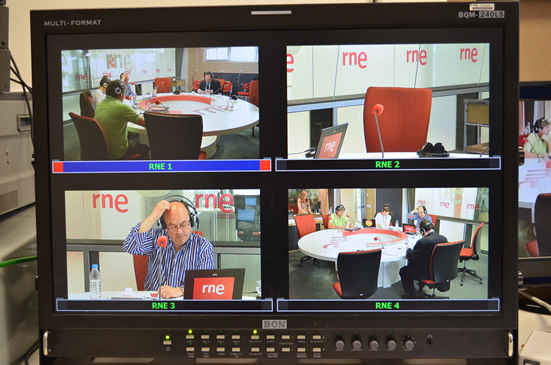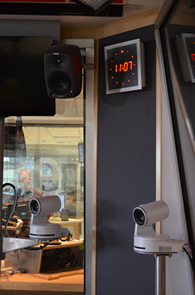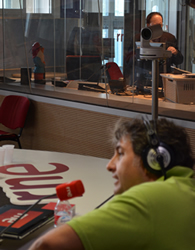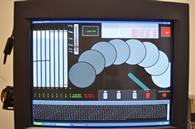Case Studies: SPANISH NATIONAL RADIO RNE (Spain)
Spanish National Radio RNE,
Listen and Watch With Panasonic
The radio, as always, is listened to, but as of today, it is also watched

In addition to its conventional radio broadcasting, Spanish public radio broadcaster RNE (Radio Nacional de España) can now be watched online.
New studios in Prado del Rey have been equipped with Panasonic HD integrated cameras, which allow you to watch everything that goes on in the studio on the Internet, with excellent picture quality. In addition to live radio programs, the studio can also be used for live television broadcasts, and is used by the TVE news channel "24 Horas".
"The radio, as always, is listened to, but as of today, it is also watched". With these words, Director of RNE Manuel Ventero, inaugurated the new studios of Radio Nacional equipped with Panasonic HD integrated cameras. RNE is ahead of times and is committed to live streaming both audio and video. Thanks to an advanced control application, video production is performed automatically, depending on who is speaking at any time.
"We have advanced radio technology, but also television technology, with permanent cameras that allow us to show what's going on in the studio. We have made a considerable effort and a substantial investment in order to stay ahead of times and to turn the studio into a TV studio in case of breaking news" says Director of RNE Manuel Ventero.
Specifically, our main studio 101 has four Panasonic AWHE120 pan-tilt-zoom cameras, as well as lighting systems and a control room, using an AW-RP50 control panel and an AW-HS50 video switcher. The cameras are controlled via IP from an automated control application, developed by the maintenance department of RTVE.
Cameras are connected to central news studios in Madrid (Torrespaña), so that it is not necessary to send TV equipment in order to provide radio contents to TVE. TVE (Television Española) is the Spanish public broadcaster, and belongs to the same corporation (RTVE) as RNE.



Automated production: nobody on the switcher
In order to convert radio programs into TV ones in a quick and simple way, the system includes an automated production mode, which produces a program signal without any person being in charge of the switcher. Thanks to a software application developed by the technical department of RTVE, the system selects the appropriate camera depending on who is speaking at any time.
The control application detects the audio signal of each microphone in the studio, and selects the camera that is trained on the person speaking, as long as the signal has both minimum duration and minimum level. The application also takes into account other aspects, such as the minimum duration of a camera selected in program, or priority management between presenter and guests. The four cameras in the studio offer close-up shots of the presenter and some guests, plus a general view.
Being pan-tilt-zoom cameras, the application is able to call up different presets, depending on the number of guests. For instance, studio 101 can be a venue for live music shows, which requires different camera positions. This is also the reason why the application can deal with up to 8 microphones.
The control application has a graphic interface that shows a visual representation of each camera shot. Some settings can be adjusted, such as minimum length of a camera selected in program (default is 2 seconds). AW-HE120 cameras and AW-HS50 video switcher are controlled through an IP network.
At any time, the automated production mode can be disabled. Some programs are produced in the traditional manual mode, with an operator selecting cameras on the switcher. Auto or manual modes can be selected by pressing a button on the GUI.
The automated production system, composed of Panasonic IP integrated cameras, IP-controlled video mixer, and a software application developed by TVE, allows to turn radio into TV with resource optimization and with TVE-level picture quality. Radio Nacional is streaming live on www.rtve.es/radio/directo.

RNE is part of RTVE (Radiotelevision Española) and operates a network of six channels: Radio Nacional (predominantly speech programming), Radio Clásica (concerts and classical music), Radio 3 (pop, rock and folk music), Ràdio 4 (regional broadcasting in Catalan), Radio 5 Todo Noticias (24-hour news) and international service Radio Exterior de España.
* The Users Reports provided aboveis correct as of the time of publication. Note that information such as company and organization names may no longer be correct.


